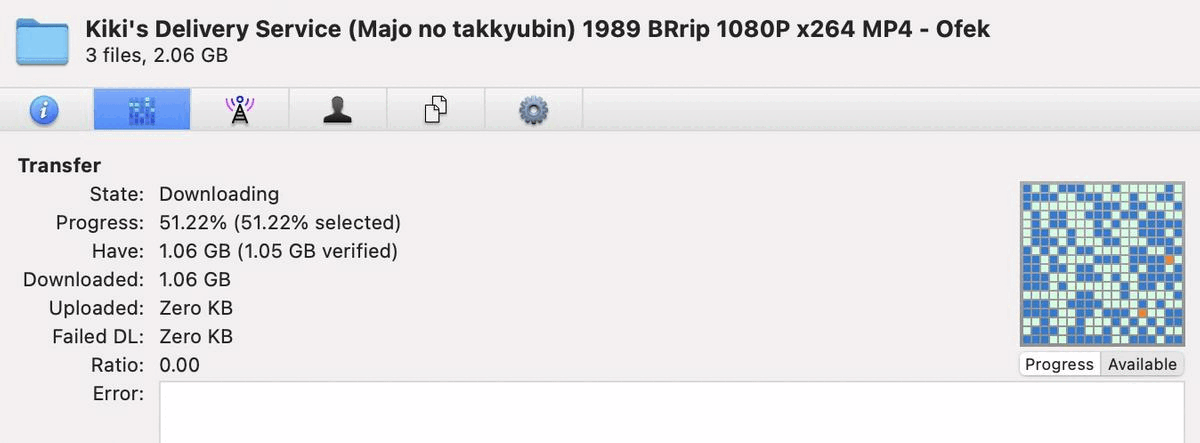How BitTorrent Is Better Than BitCoin

Ifyou want to decentralize the Internet, we already have a protocol for that. It’s not anything like BitCoin. It’s BitTorrent.
What Is BitTorrent?
If you’re my age you remember peer-to-peer file-sharing services fondly and well. They have mostly been superseded by centralized, paid, platforms, basically because governments bludgeoned P2P to death.
Where I live now, however, I still use P2P because those centralized companies give a shit about us. Most streaming services simply aren’t available on this island, which is why we turn to piracy. This, for example, is how I’ll download Kiki’s Delivery Service:

I find a link on PirateBay and then download the file ‘bit by bit’ from other users. Instead of downloading it from one corporate server, I download it from other people’s computers. And whatever I’m downloading, I share. It’s completely decentralized, except for the website I get the links from.
The cool thing about BitTorrent is that more people downloading a file actually makes it faster. Unlike the centralized Internet — where even an article going viral can crash a servers — every user becomes a new server with BitTorrent. It scales tremendously well, and doesn’t require some of the smartest people in the world sitting around optimizing servers all day.
BitTorrent is also very difficult to ‘censor’ because as long as one person somewhere has a copy of the file, you can theoretically download it. While you can shut down the websites that host the links, you can’t actually remove the files.
This old protocol, in short, delivers all the hype about Web3, but no one talks about it because Web3, of course, isn’t about decentralization at all. It’s just the latest entertainment to keep people in the casino, gambling on crypto-currency. As you’ll remember, it didn’t turn out to be much of a currency either.
Crypto Is Not Decentralized And Never Will Be
As Moxie Marlinspike (founder of Signal) goes into, crypto is not actually decentralized at all. This is somewhat obvious in that it’s literally about private ownership. So far the proof of concept has been one person owning one JPEG, which is as absurdly centralized as you could get.
Marlinspike, however, took crypto-bros at their word and actually made and minted an NFT, which then promptly broke the very concepts of decentralization and ‘censorship-resistance’.
After a few days, without warning or explanation, the NFT I made was removed from OpenSea (an NFT marketplace)…
The takedown suggests that I violated some Term Of Service, but after reading the terms, I don’t see any that prohibit an NFT which changes based on where it is being looked at from, and I was openly describing it that way.
What I found most interesting, though, is that after OpenSea removed my NFT, it also no longer appeared in any crypto wallet on my device. This is web3, though, how is that possible?
This was possible because his wallet displayed NFTs by “making API calls to three companies that have consolidated in this space.” AKA, centralization.
Given the history of why web1 became web2, what seems strange to me about web3 is that technologies like ethereum have been built with many of the same implicit trappings as web1. To make these technologies usable, the space is consolidating around… platforms. Again. People who will run servers for you, and iterate on the new functionality that emerges. Infura, OpenSea, Coinbase, Etherscan.
In order to make crypto currencies or art into any sort of usable product, they have to be centralized. And they won’t get any better at this, because the blockchain protocol is fundamentally slow as shit and not designed in any way around decentralization.
Again, it is literally designed about centralizing and owning things, not decentralizing and setting them free. It’s not even that the blockchain is not good at this, it is actually the worst.
The blockchain is fundamentally just a shitty database that you can gamble on. That’s all it is. The database itself is decentralized, but it can’t process more than 5 transactions per second without shitting itself and burning down a rainforest. The idea that we’re going to run the Internet on this roulette table is absurd.
Web3 Is Bullshit
The fact that monied elites are getting behind blockchain/crypto should tell you that it is not in fact revolutionary. Since when have rich people been interested in actual revolutions? It’s just a marketing ploy.

If Web3 actually decentralized the Internet, what would people be investing in?How would they profit? Decentralized protocols like HTML, TCP/IP, or BitTorrent are not ‘owned’ by anyone. They create tons of value but capture none of it. This is the last thing investors want. What are we? Governments?
In contrast Facebook is profitable because it centralizes social activity in one place, where you can then serve ads. Microsoft was profitable because it centralized people on one operating system, which was paid. Amazon is profitable because it centralizing shopping.
Investors are looking for the next Facebook or Amazon, not the next HTML. They want to own the next big token, the next big exchange, not give anything away. Anything that actually decentralizes power will be violently suppressed, not invested in.
Remember?
This is precisely what happened with peer-to-peer file sharing. Napster delivered an actually decentralized system, where anyone anywhere could share music, movies, and content. Did rich people invest in that? Hell no. They shut that shit down.
Corporations lobbied governments, waving artists in front of their property rights like a bloody flag. Governments effectively shut down services like Napster, made them illegal, and even prosecuted users. No investor would touch the sector with a ten-foot pole and—while it didn’t disappear—it never grew.
Instead we got centralized platforms like Spotify, which pay artists pennies while making investors and copyright holders rich. Which was the point all along. It was (and is) always about private property, never public good.
We also got centralized platforms like Netflix, and Amazon Prime which are actually much less efficient than peer-to-peer. That have to invest huge amounts of time and money in making videos play without breaking the Internet, something peer-to-peer does naturally and for free.
But free was never the point. The point was always money, and all the money’s in centralizing shit and setting up a toll booth. It’s the same thing with Web3.
Actual Decentralization Is A Threat To Investors, Not An Opportunity
An actually decentralized Internet is of no interest to any investor, no more than Napster was. They make money from enclosing commons, not creating them.
If investors are interested in a technology you can be guaranteed that it’s not decentralizing. Just follow the money.
All the money’s in centralization. All the money’s in gatekeeping. Web3 is just the final evolution of this scheme into a Ponzi scheme. They’re selling tickets at a gate that leads nowhere at all. It’s pure profit. It’s obscene.
They sold it based on being a currency, or being art, or now decentralizing the Internet, but it’s all as real as a magic show at a casino. It’s not fucking real. It’s just a distraction, entertainment to keep you inside the casino, gambling away at the data tables, while the real owners walk away with the real money.